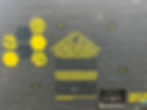Mock orange
- beecollectivetas
- Oct 11, 2022
- 3 min read

Maitland is an old town. It sits inland from Newcastle on the banks of the Hunter river. The Georgian and Regency style buildings scattered throughout the streets speak to a past that is resonated in the present as coal trains rattle to and from the Port of Newcastle. In 2022, it is a town generating a vibrant art scene, street art and cute little cafes. The smell of mock orange fills the humid air.
Maitland is also in the varroa mite red zone.

Street art High St, Maitland.
The discovery of varroa mite, at the Port of Newcastle in June has resulted in a state-wide emergency response mobilising people from all over the country. The aim is to stop the spread of the mite through field surveillance and extermination of all bee hives within a 10km radius of an identified varroa mite positive site. The program is now in the extermination phase.
In a perfect world the task should be straight forward. Beekeepers would complete a training program, register their hives and engage in best practice bee husbandry. The Department of Primary Industries (DPI) would then be able to trace every hive and proceed with directives issued through the emergency response process.
But the world is not perfect.
Hives without bottoms boards, crumbling hives that haven’t been opened in years, hives stuck together with tape, unregistered hives, new beekeepers watching their hives swarm and not knowing what to do all adds to the complexity of the task for teams on the ground. My last evening was spent hunting out hives in the bush in driving rain - as many dead outs as live bees but we had to check each and every one before we euthanised the 80+ live hives.
Perhaps the most distressing visit was to a single Flow Hive in a beautiful location. The owner told me the red zone went straight through the middle of their property and if the hive had been on the other side of the fence, half a metre away, they would have been protected. The hive was relatively new and well kept- the bees beautifully calm and unaware of their impending sacrifice.

The Bikesmith espresso cafe in Maitland used to have a beehive on its roof.
In most instances the owners were understanding. I attribute this to the work of dedicated staff on the ground who were continuously communicating with owners, offering empathy and support every step of the way. A difficult task on top of a difficult task.
A baiting program is about to start to capture feral European honeybee populations. People with native bee hives have been asked to move their colonies out of the zone. The impact on the broader pollinator network will be significant- sugar feeders laced with fipronil will bring all the pollinators to the yard. And to their death.
The long term impact of hive removal, fipronil baiting and a 3 year ban on beekeeping in the red zone will be significant. One of my observations while I was working in the area was a need for a strong connected community so that when beekeeping is allowed to start again, people will have the beekeeping skills and support they need to start again. This will need to include children, as they have an active role to play in rebuilding an industry that has been decimated. This investment needs to start now.
My hope is that enough work can be done collectively to stop the spread of varroa mite. The consequences for Australian beekeepers and our food security is immeasurable. This is what I thought about each morning before I started my shift - I walked the historic streets of Maitland, East Maitland and the neighbouring township of Morpeth. The scent of mock orange compelling me to seek out the flowers- flowers conspicuously empty of bees.

